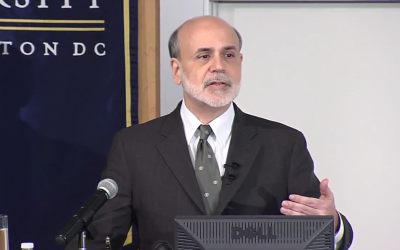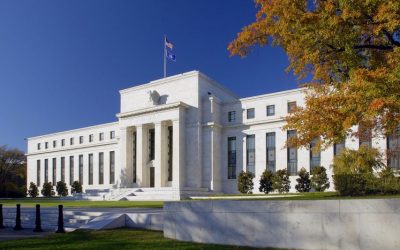How’s this for a great idea: we build a small fleet of cars, and market them to people in the local community. How do we compete with Ford, G.M., Toyota, and all those other huge car companies? Easy. You see, our cars will have special octane requirements that will...
Money & Banking
Where’s My Model?
Anyone who peruses my work on free banking—or my other writings for that matter—will notice that I’m not especially inclined to express my ideas mathematically. To put the matter more positively: I prefer plain English. The preference has if anything grown more marked...
Capital and Cash Reserves
I promise to make this my last post for a while concerning the matter of 100-percent versus fractional-reserve banking. However, in addressing some comments on my recent posts it occurred to me that some very serious misunderstanding is at play concerning the...
Those “Other” 100 Percent Reserve Banking Advocates
In the aftermath of the U.S. banking crises of the 1930s, it became common for American economists to speak of the “inherent” instability of fractional-reserve banking and of the “perverse elasticity” of money supply in fractional-reserve banking systems. What the...
The State and 100 Percent Reserve Banking
Free bankers have been fighting a war on two fronts. On one they face champions of central banking and managed money. On the other they struggle against advocates of 100-percent reserve banking.
Anti-Bernanke
Despite the bright light streaming into my office window, reminding me of the beautiful spring weather here in Athens, I managed to spend most of yesterday afternoon listening to the first installment of Ben Bernanke's 4-part lecture series on "The Federal Reserve and...
Yet Another (Unconvincing) Argument Against Gold
It seems that various pro-gold utterances in the course of the Republican primaries have provoked critics of the gold standard to circle their wagons and start shooting. But while the sheer volume of shots fired has been impressive, the shooters' aim has been lousy....
Warren Buffet: The Crony Oracle of Omaha
Warren Buffet is a crony capitalist who bends the truth to serve his long-held ideological commitment to big government.
Bernanke Spooks Gold
This past week, gold and silver experienced one of their steeper drops in recent months. After gold had touched a four month high, and silver came close to a six month high, prices abruptly reversed course. By the end of the week gold had sold off more than 5 percent,...
America Mortgaged at an Adjustable Rate
The Federal Reserve ran another "stress test" on major financial institutions and has determined that 15 of the 19 tested are safe, even in the most extreme circumstances: an unemployment rate of 13%, a 50% decline in stock prices, and a further 21% decline in housing...
Central Banks Beat Up on Private Creditors
Last week the Greek government, with the heavy handed support of its larger friends in the Eurozone, succeeded in coercing some 85.8 percent of private sector bondholders to "voluntarily" exchange €206 billion-worth of Greek sovereign bonds for newer bonds with longer...
Inflation Held in Check by Fear
History has shown us time and again that out of control money supply expansion creates inflation. In light of the trillions of synthetic dollars that have been injected into the economy by the Federal Reserve over the past five years, most observers (this one...
Keynesians Jump the Gun on Inflation
Advocates of government stimulus are running victory laps on recent developments that appear to vindicate their strategy. In particular, Paul Krugman compares the sluggish growth in Europe to the somewhat-less-sluggish growth in the US to prove that stimulus was more...
Great Depression II: Key Indicators of a New Depression
With the mainstream media focusing on the country's leveling unemployment rate, improving retail sales, and nascent housing recovery, one might think that the US government has successfully navigated the economy through recession and growth has returned. But I will...
Use Bankruptcy Courts Not More Financial Regulation
"I'm from the government, and I'm here to help." Ronald Reagan considered those nine words the most terrifying in the English language. And the government has been offering a lot of such help lately. Most recently, of course, is the trillion-dollar health care bill...
Inflation and Deficits: Politicians Cause Inflation
With the massive increases in federal spending, inflation is one of the risks that awaits us. To protect us from the political demagoguery that will accompany that inflation, let's now decide what is and what is not inflation. One price or several prices rising is not...
Fraud in Academia: Grade Inflation 101
Soon college students will come home and present parents with their grades. To avoid delusion, parents should do some serious discounting because of rampant grade inflation. If grade inflation continues, a college bachelor's degree will have just as much credibility...
Altruism: The Moral Root of the Financial Crisis
The financial crisis is, fundamentally, a moral crisis. To end the crisis, we must acknowledge that government intervention caused it, and we must demand that the government begin removing its coercive hands from the economy. With an eye to the short term, we must demand that it scale back the powers of the GSEs, the Federal Reserve, and the FDIC; and with an eye to the long term, we must demand that the government abolish these agencies entirely and restore a gold standard run by private, currency-issuing banks subject solely to the objective commercial and bankruptcy codes.
Message To The Bailout Boys: Bankruptcy is Economically Valuable
What is bankruptcy? Bankruptcy is a financial state that occurs when a person or business can no longer repay its debts. In the legal sense, bankruptcy begins when a court recognizes that the financial state of bankruptcy exists. The bankruptcy court takes charge...
Blame Socialist Government Policies Not Capitalism for the Financial Crisis
Massive government interventions in the market in the form of myriad regulations and financial irresponsibility on the part of the government are really to blame.
Government Bailouts are Unjust: Let Bankruptcy Courts Take the Wheel
Is General Motors to become a brain-dead patient in a Federal bailout ward, languishing on tax-funded life support beyond all hope of recovery? Not if Congress steps aside and lets the bankruptcy courts do justice through adjudication.
The Real Problem With Tim Geithner for Treasury
Tim Geithner is an awful choice for Treasury secretary, but not for the reasons other objectors are suggesting.
Another Great Depression?
With both Barack Obama's supporters and the media looking forward to the new administration's policies being similar to President Franklin D. Roosevelt's policies during the 1930s depression, it may be useful to look at just what those policies were and-- more...
Bailout Parade Panic and The Benefits of Bankruptcy
Let's not allow Congress and members of the bailout parade panic us into allowing them to do things, as was done in the 1930s, that would convert a mild economic downturn into a true calamity. Right now the Big Three auto companies, and their unions, are asking...
Like this content? Subscribe to support our work — it's free.
Read by students, professors, and citizens, Capitalism Magazine provides over 9,000 free to read articles and essays from pro-reason, individual rights perspective. 100% independent.
No spam. Unsubscribe anytime.






